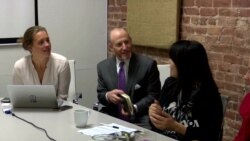Many companies aim for “Best in Class” status, but some are seeking another “B” — B corporation certification.
Certified B corporations, or “B corps,” address the growing consumer interest in supporting socially and environmentally responsible companies.
B corps are essentially for-profit companies that behave more like nonprofits, tackling global issues such as pollution and income disparity through everyday business practices.
‘Business as a force for good’
“B corporations are companies that are using their business as a force for good,” said Andrew Kassoy, co-founder of B Lab, the nonprofit organization that issues B corp certification. “By having that B corp certification, it makes good easy for the consumer ... to know that the company is having a positive impact on society,” he added.
For many companies, doing good may take a back seat to making money. But not for certified B corps.
Multimillion-dollar brands like fashion company Eileen Fisher and ice cream maker Ben & Jerry’s are among businesses certified as B corps.
“In some cases, it’s about the company trying to create more value for its workers, to create opportunity for workers to grow in the economy and have a job with dignity,” Kassoy said.
“In other cases, it might be about creating a product that’s more environmentally sustainable or socially responsible,” he said.
Growing around the globe
B corps are a growing global movement. Brands large and small make up the more than 2,000 certified B corporations, representing 130 different industries in 55 countries.
“Our foreign certifications are outpacing our U.S.-based certifications for the last year,” said Jennifer Warden, B Lab’s global partner manager. “We’ve got partners in 13 different regions — a lot in Latin America, Europe, a lot of momentum now in the Asia Pacific regions and Africa.”
To qualify as a B corp, companies must score at least 80 out of 200 points on an assessment that covers four key areas: corporate governance, employee rights, community outreach and environmental impact. Everything from waste reduction efforts to leadership roles for women and minorities are considered.
“You’re able to measure how you rank in terms of taking care of the community, how you rank in taking care of the environment, how you take care of your customer,” said Sean Cullen, project coordinator at Uncommon Goods, a Brooklyn-based online retailer that is a certified B corp.
Assessments are made every two years. In addition to maintaining a minimum score, certified B corps are also required to revise company bylaws to reflect accountability to workers and customers.
Depending on a company’s size, B corp certification costs $500 to $25,000 annually. For many, the payoff is in being among the best in the business.
Look for the logo
“When you see that certified B Corp logo on different products, you know that you’re getting a good product,” Cullen said.
B Lab maintains a website with a B corporation directory so consumers can look up a company and verify its certification.
“The goal is that one day, all companies will be able to manage and measure their impact with the same rigor as their profits,” Kassoy told VOA.
“And by doing that … all companies will compete to be best for the world, not just best in the world,” he said.





